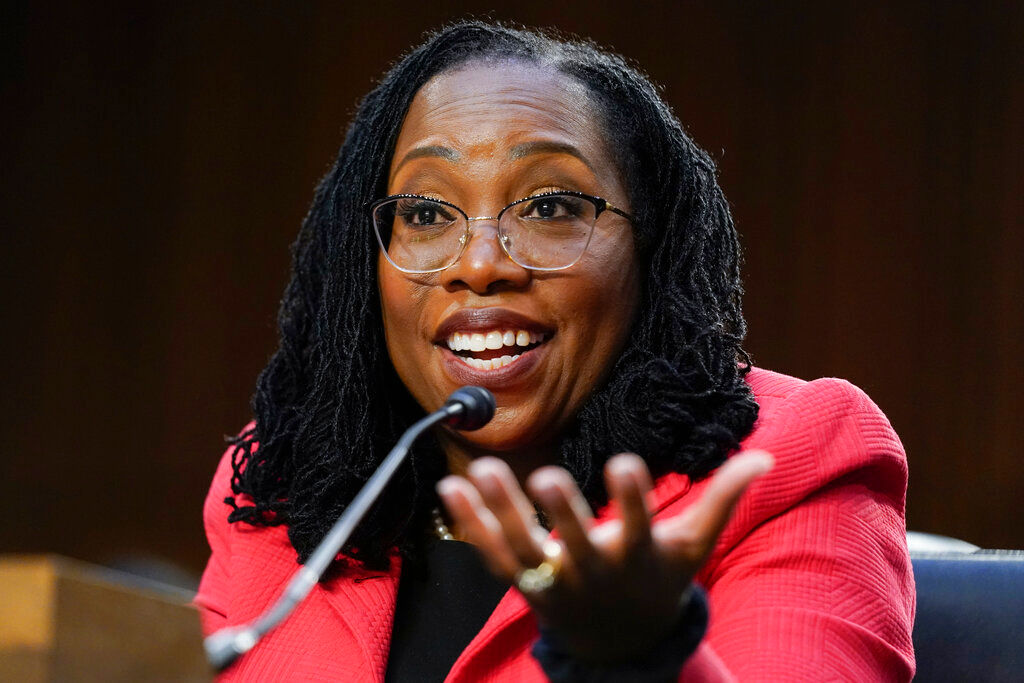Judge
Ketanji Brown Jackson has put her religious faith front, centre — and vague.
Also Read: Elon Musk, Grimes welcome second child named Exa Dark Sideræl Musk
She’s
spoken strongly of the role of her faith in her life and career but hasn’t
gotten into the specifics of that commitment. Her beliefs have drawn some
attention as she undergoes Senate Judiciary Committee hearings this week for
her nomination to the Supreme Court.
“I
must also pause to reaffirm my thanks to God, for it is faith that sustains me
at this moment,” Jackson told the committee on Monday, in words similar to
her opening remarks after President Joe Biden introduced her last month as his
nominee. “Even prior to today, I can honestly say that my life had been
blessed beyond measure.”
Jackson
identifies as a nondenominational Protestant, she told the committee on
Tuesday, when questioned by Sen. Lindsey Graham, R-S.C.
Also Read: ‘Russian economy experiencing shock impact’: Kremlin on sanctions by West
Graham
pressed, asking how often she attends church. “On a scale of 1 to 10, how
faithful would you say you are in terms of religion?”
Jackson
replied, “I am reluctant to talk about my faith in this way just because I
want to be mindful of the need for the public to have confidence in my ability
to separate out my personal views.” She said her faith is important but
noted the Constitution prohibits any religious test for public office.
Graham
agreed and conceded she could be impartial — but said he was trying to raise a
comparison with what he deemed unfair treatment of a Republican nominee by
Democrats. They inquired whether the Catholic views of Amy Coney Barrett in
2017 — then being confirmed to the U.S. Court of Appeals — would influence her
decisions on cases like the Roe v. Wade ruling legalizing abortion. Barrett
joined the Supreme Court in 2020.
Also Read: US VP Kamala Harris calls for probe into Russian ‘war crimes’ in Ukraine
Alluding
to Democratic Sen. Dianne Feinstein’s famous exchange with Barrett, Graham
said, “How would you feel if a senator up here said, ‘The dogma lives
loudly within you and that’s of concern’?”
If
Jackson has a specific church affiliation, it could not be readily found in
standard Google searches, nor through a keyword search of the roughly 2,000
pages of documents released by the Judiciary Committee, which include a large
swath of Jackson’s public record — such as speeches and judicial decisions.
Jackson
regularly speaks of the motivating power of faith and prayer — whether in a
high school commencement address or a speech on the deep faith of civil rights
activists. In an exchange Tuesday with Democratic Sen. Cory Booker, she said,
“I focus at times on my faith when I am going through hard times.”
But
the record gives no hint of whether she ever belonged to a specific
congregation, whether she’s held any church leadership role or whether she
attends services regularly.
Also Read: Top Russia, Ukraine diplomats to meet for first time since invasion
For
supporter Barbara Williams-Skinner, none of that matters so much as her public
life.
“She
says she’s a strong person of faith, and we’ve seen it in action,” said
Williams-Skinner, co-convener of the National African American Clergy Network.
She cited Jackson’s work as a public defender, making a “choice to defend
those who cannot defend themselves,” and on the bipartisan U.S. Sentencing
Commission.
“People
who may not even agree with her on a range of issues believe she will lean on
her faith to be fair, to be committed to the Constitution,”
Williams-Skinner said.
Historically,
the majority of the justices have been Protestant. But today, the court has six
Catholic, one Protestant and two Jewish justices, although the latter number
will go down by one when Justice Stephen Breyer’s retirement takes effect. The
lone Protestant, Neil Gorsuch, grew up Catholic, but more recently has attended
Protestant services.
Also Read: Joe Biden will announce fresh sanctions on Russia during Europe trip: Report
Jackson
has faced some cases involving church-state law, but she has refused to lay out
a philosophy addressing it.
When
facing Senate confirmation hearings for a position on the U.S. Court of Appeals
for the District of Columbia Circuit in 2021, senators peppered her with
questions about whether she agreed with court rulings that overturned state
restrictions on funding for religious institutions or on public worship during
the pandemic.
In
a written reply to senators, she cited the “indisputable fact” that
the Constitution “protects a fundamental and foundational right to
religious liberty.” She noted the Supreme Court has been working through
the implications of “what it means to treat religious organizations
differently,” and she said she’d be bound by those precedents.







